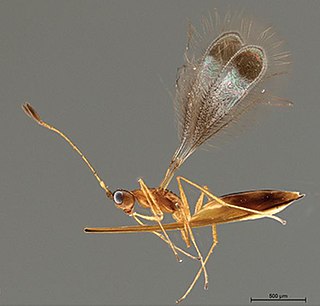
Chalcid wasps are insects within the superfamily Chalcidoidea, part of the order Hymenoptera. The superfamily contains some 22,500 known species, and an estimated total diversity of more than 500,000 species, meaning the vast majority have yet to be discovered and described. The name "chalcid" is often confused with the name "chalcidid", though the latter refers strictly to one constituent family, the Chalcididae, rather than the superfamily as a whole; accordingly, most recent publications (e.g.,) use the name "chalcidoid" when referring to members of the superfamily.

Alexander Henry Haliday was an Irish entomologist. He is primarily known for his work on Hymenoptera, Diptera, and Thysanoptera, but worked on all insect orders and on many aspects of entomology.

The Mymaridae, commonly known as fairyflies or fairy wasps, are a family of chalcidoid wasps found in temperate, subtropical, and tropical regions throughout the world. The family contains around 100 genera with 1,400 species.

Alexandre Arsène Girault was an American entomologist specializing in the study of chalcid wasps. An eccentric and controversial figure, Girault was also a prolific and dedicated entomologist. He published more than 325 papers and described over 3000 new taxa from Australia.

An Essay on the Classification of the Parasitic Hymenoptera of Britain Which Correspond with the Ichneumones Minuti of Linnaeus is a Victorian monograph of entomology published in the Entomological Magazine between 1833 and 1838, by the Irish entomologist Alexander Henry Haliday.

Chorebus is a genus of parasitoid wasps in the family Braconidae. There are around 430 accepted species in the genus.
Anaphes nitens is a species of fairyfly, a chalcid wasp in the family Mymaridae. Native to Australia, it is an egg parasitoid of the gum tree snout beetle, a pest of Eucalyptus trees, and has been used in biological pest control of that species.

Polynema is a genus of fairyflies or fairy wasps, insects in the family Mymaridae.

Telenomus is a genus of parasitoid wasps from the subfamily Telenominae. The genus was first described by Alexander Henry Haliday in 1833. Species in this genus parasitise the eggs or immature stages of other insects.

Entedoninae is a subfamily of wasps in the family Eulophidae. The subfamily includes over 90 genera.

Eulophinae is a subfamily of wasps in the family Eulophidae which includes over 90 genera.
Adelius is a genus of parasitoid wasps in the family Braconidae, first described in 1833 by Alexander Henry Haliday.

Macroglenes is a genus of chalcidoid wasps in the family Pirenidae. There are at least 20 described species in Macroglenes.
A list of the species of Hymenoptera from New Zealand; which includes ants, bees, parasitoids, sawflies, and social wasps.
Chirothrips is a genus of insects belonging to the family Thripidae.
Catocha is a genus of wood midges in the family Cecidomyiidae. There are eight described species. The genus was established in 1833 by Irish entomologist Alexander Henry Haliday.

Baeus is a genus of wasps in the family Scelionidae. They are parasitoids of spider eggs. They have a cosmopolitan distribution, being found on every continent but Antarctica.











